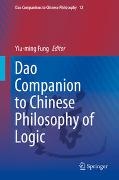Ulteriori informazioni
This book is a companion to logical thought and logical thinking in China with a comparative and interdisciplinary perspective. It introduces the basic ideas and theories of Chinese thought in a comprehensive and analytical way. It covers thoughts in ancient, pre-modern and modern China from a historical point of view. It deals with topics in logical (including logico-philosophical) concepts and theories rooted in China, Indian and Western Logic transplanted to China, and the development of logical studies in contemporary China and other Chinese communities. The term "philosophy of logic" or "logico-philosophical thought" is used in this book to represent "logical thought" in a broad sense which includes thinking on logical concepts, modes of reasoning, and linguistic ideas related to logic and philosophical logic. Unique in its approach, the book uses Western logical theories and philosophy of language, Chinese philology, and history of ideas to deal with the basic ideas and majorproblems in logical thought and logical thinking in China. In doing so, it advances the understanding of the lost tradition in Chinese philosophical studies.
Sommario
Introduction Part I: Concepts in Chinese Philosophy of Logic.- Chapter 1: Names.- Chapter 2: Naming and Reference.- Chapter 3: Sentences and Propositional Attitudes.- Chapter 4: Sameness and Difference.- Chapter 5: Reason/Cause and Principle.- Chapter 6: Classes and Individuals.- Chapter 7: Modalities and Quantifiers.- Chapter 8: Truth.- Chapter 9: Contradiction.- Chapter 10: Analogy .-Chapter 11: Reasoning.- Chapter 12: Argumentation.- Chapter 13: Language and Meaning/Intention.- Chapter 14: Definitions (Operative Concepts).- Chapter 15: Counter-factual Conditionals (Operative Concepts).- Part II: Issues and Theories in Chinese Philosophy of Logic.- Chapter 16: Logical Thought in Mohism and Later Mohism.- Chapter 17: Logical Thinking in the Gongsun Longzi .-Chapter 18: Paradoxes in the School of Names.- Chapter 19: The Rectification of Names in Confucianism.- Chapter 20: Metaphorical and Analogical Thinking in the Mencius.- Chapter 21: Problems of Language andLogic in Daoism.- Chapter 22: Paradoxical Language in Zen.- Chapter 23: Buddhism.- Part III: Logical Thought Transplanted from India and the West.- Chapter 24: Yin-ming in Chinese Buddhism.- Chapter 25: Aristotle in (Pre-modern) China.- Chapter 26: Logic and re-discovering Logic in Modern China.- Part IV: Logical Studies.- Chapter 27: Logical Studies in Contemporary Mainland China.- Chapter 28: Logical Studies in Contemporary Taiwan.- Index.
Riassunto
This book is a companion to logical thought and logical thinking in China with a comparative and interdisciplinary perspective. It introduces the basic ideas and theories of Chinese thought in a comprehensive and analytical way. It covers thoughts in ancient, pre-modern and modern China from a historical point of view. It deals with topics in logical (including logico-philosophical) concepts and theories rooted in China, Indian and Western Logic transplanted to China, and the development of logical studies in contemporary China and other Chinese communities. The term “philosophy of logic” or “logico-philosophical thought” is used in this book to represent “logical thought” in a broad sense which includes thinking on logical concepts, modes of reasoning, and linguistic ideas related to logic and philosophical logic. Unique in its approach, the book uses Western logical theories and philosophy of language, Chinese philology, and history of ideas to deal with the basic ideas and majorproblems in logical thought and logical thinking in China. In doing so, it advances the understanding of the lost tradition in Chinese philosophical studies.
Testo aggiuntivo
“The volume deals with aspects of the philosophy of logic, philosophical logic, and philosophy of language from the beginnings of Chinese philosophy until today. It thereby serves as a reference tool for queries into the subject matter … . chapters are original, well-argued, and well written. … The volume is a stimulating contribution to the study of Chinese thought.” (Barbara Hendrischke, Religious Studies Review, Vol. 46 (4), December, 2020)
Relazione
"The volume deals with aspects of the philosophy of logic, philosophical logic, and philosophy of language from the beginnings of Chinese philosophy until today. It thereby serves as a reference tool for queries into the subject matter ... . chapters are original, well-argued, and well written. ... The volume is a stimulating contribution to the study of Chinese thought." (Barbara Hendrischke, Religious Studies Review, Vol. 46 (4), December, 2020)

